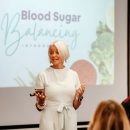Confront your fears: being ‘the quiet one’
Ellen Tout, Psychologies’ editorial assistant, was scared to speak up in meetings

For as long as I can remember, I’ve been ‘the quiet one’ – at school my reports would say, ‘Ellen should speak up more’. I loved to write but, when it came to contributing ideas out loud, my fear of getting it wrong meant I’d sit in silence. My first job didn’t involve speaking up and I became comfortable typing away behind my screen.
When I joined Psychologies, my work dynamic changed. It was a dream job and I felt overwhelmed – surrounded by confident and successful women. I’d sit quietly, overshadowed in meetings.
So, having never spoken to a coach before, I contacted Kay White. In my first session, we talk about my frame of mind and what I believe will happen if I do speak up. I feel confident on a one-to-one basis, but talk myself out of contributing in meetings; questioning that my ideas are not good enough.
White suggests that I imagine everyone has an ‘invisible sign’ around their neck which says ‘make me feel important’. She points out that people are more interested in themselves than in spotting my errors. This helps me to understand that, if my idea isn’t taken up, it isn’t personal, and I find myself able to start thinking of meetings as a discussion, rather than a room full of people waiting to trip me up.
Often, I am so busy listening to my internal chatter that I miss the chance to take part. White says: ‘A great tip to use in meetings is to repeat, in your head, everything that people say. That way you’re present in the conversation and can react. Listening is a powerful tool for speaking up.’ I find this allows me to focus and respond more naturally.
I explain to White how I struggle to know how and when to jump into a discussion. She recommends agreeing with a colleague’s comment first, using their name, then adding a few points. She advises choosing words like ‘and’, rather than ‘but’, which help you to be perceived as contributing positively. If you’re unsure about your idea, she suggests summing it up with three key points.
People often ask me to ‘speak louder’ but, when I tell White this, she says to ‘speak with more energy’. She adds that, if you’re feeling uneasy or anxious, sitting up straight can make a big difference. Give yourself a second to breathe and change your perspective from ‘this meeting is going to go badly’ to ‘I can do this’.
If you’re like me, convincing yourself that you can speak up will take you over one of the biggest barriers. I’ve realised that I’ll never be the loudest person in the room (and I wouldn’t want to be), but my self-assurance is steadily growing.
Kay White is author of The A To Z Of Being Understood (Expert Author Publishing, £11.99).
Photograph: iStock








